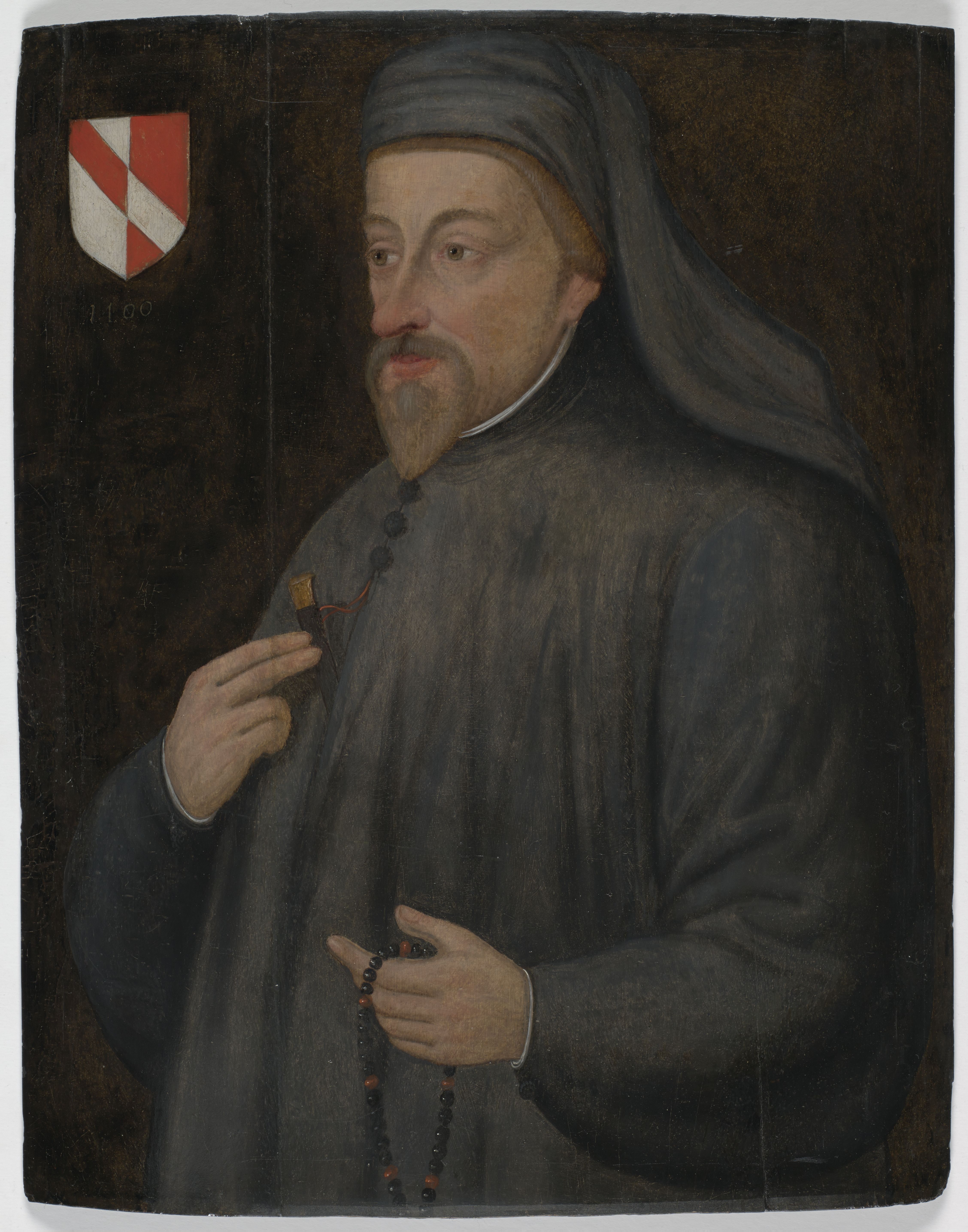Frases célebres de Geoffrey Chaucer
“¿Qué hay mejor que la sabiduría? Una mujer. ¿Y qué hay mejor que una buena mujer? Nada.”
Fuente: Chaucer, Geoffrey. Los cuentos de Cantorbery, Volumen 1. Editorial Reus (s.a.), 1921. p. 233.
Frases de hombres de Geoffrey Chaucer
Frases sobre el corazón de Geoffrey Chaucer
Geoffrey Chaucer Frases y Citas
“nada que es completo en sí mismo es más fuerte cuando se divide.”
Cuentos de Canterbury
Cuentos de Canterbury
“El amor es una cosa tan libre como el espíritu.”
Cuentos de Canterbury
Cuentos de Canterbury
Fuente: Chaucer, Geoffrey. Cuentos de Canterbury. Editorial e-artnow, 2014. ISBN 9788026806868.
Fuente: El cuento de la comadre de Bath, comienzo.
“Lo que comenzó mal, rara vez y con muchísima dificultad concluirá bien".”
Cuentos de Canterbury
“según Séneca, "el airado y enojado no puede hablar de algo sin vituperarlo".”
Cuentos de Canterbury
“soy el árbol que florece antes de que el fruto madure.”
Cuentos de Canterbury
“la plenitud de la felicidad consistía en el deleite perfecto”
Cuentos de Canterbury
“el que habla mal no puede nunca recobrar sus palabras.”
Cuentos de Canterbury
“es imposible hallar al caballo perfecto en todos los aspectos”
Cuentos de Canterbury
Contestación del caballero a la reina respondiendo a su requerimiento de que averigüase qué es lo que más desean las mujeres.
Cuentos de Canterbury
Fuente: El cuento de la comadre de Bath.
“El proverbio dice que muchos pocos hacen un mucho.”
Cuentos de Canterbury
Original: «The proverbe saith that many a smale maketh a grate».
Geoffrey Chaucer: Frases en inglés
“I hold a mouses wit not worth a leke,
That hath but on hole for to sterten to.”
The Wife of Bath's Tale, l. 6154
The Canterbury Tales
“Ther nis no werkman, whatsoevere he be,
That may bothe werke wel and hastily.”
The Merchant's Tale, l. 1832-1833
The Canterbury Tales
“This noble ensample to his shepe he yaf, —
That first he wrought, and afterwards he taught.”
General Prologue, l. 498
The Canterbury Tales
“And of his port as meke as is a mayde.”
General Prologue, l. 69
The Canterbury Tales
“For iii may keep a counsel if twain be away.”
The Ten Commandments of Love
Bartlett's Familiar Quotations, 10th ed. (1919)
“But Cristes lore, and his apostles twelve,
He taught; but first he folwed it himselve.”
General Prologue, l. 529
The Canterbury Tales
“Yet in our ashen cold is fire yreken.”
The Reeve's Tale, l. 388
The Canterbury Tales
“Mordre wol out, that se we day by day.”
The Nun's Priest's Tale, l. 232
The Canterbury Tales
“For gold in phisike is a cordial;
Therefore he loved gold in special.”
General Prologue, l. 445
The Canterbury Tales
“They demen gladly to the badder end.”
The Squire's Tale, l. 10538
The Canterbury Tales
“To maken vertue of necessite.”
The Knight's Tale, l. 3044
The Canterbury Tales
“For thogh we slepe, or wake, or rome, or ryde,
Ay fleeth the tyme; it nyl no man abyde.”
The Clerk's Tale, l. 62-63
The Canterbury Tales
“But all thing which that shineth as the gold
Ne is no gold, as I have herd it told.”
The Chanones Yemannes Tale, l. 16430
Bartlett's Familiar Quotations, 10th ed. (1919), Canterbury Tales
“Min be the travaille, and thin be the glorie.”
The Knight's Tale, l. 2408
The Canterbury Tales
“And brought of mighty ale a large quart.”
The Miller's Tale, l. 3497
The Canterbury Tales
“Go, little booke! go, my little tragedie!”
Book 5, line 1798
Troilus and Criseyde (1380s)
“Harde is his herte that loveth nought
In Mey, …”
The Romaunt of the Rose, Lines 85-86 http://books.google.com/books?id=bGhZAAAAYAAJ&q=%22harde+is+his+herte+that%22+%22nought+in+mey%22&pg=PA215#v=onepage
“That field hath eyen, and the wood hath ears.”
The Knight's Tale, l. 1524
The Canterbury Tales
Book 2, line 1335-37
The earliest known near-usage in English of the proverb "Great oaks from little acorns grow."
Troilus and Criseyde (1380s)
“I am right sorry for your heavinesse.”
Book 5, line 146
Troilus and Criseyde (1380s)
“Wide was his parish, and houses fer asonder.”
General Prologue, l. 493
The Canterbury Tales
“Of harmes two the lesse is for to cheese.”
Book ii, line 470
Troilus and Criseyde (1380s)
“For tyme y-lost may not recovered be.”
Book 4, line 1283
Troilus and Criseyde (1380s)
“It is nought good a slepyng hound to wake.”
Book 3, line 764
Troilus and Criseyde (1380s)
